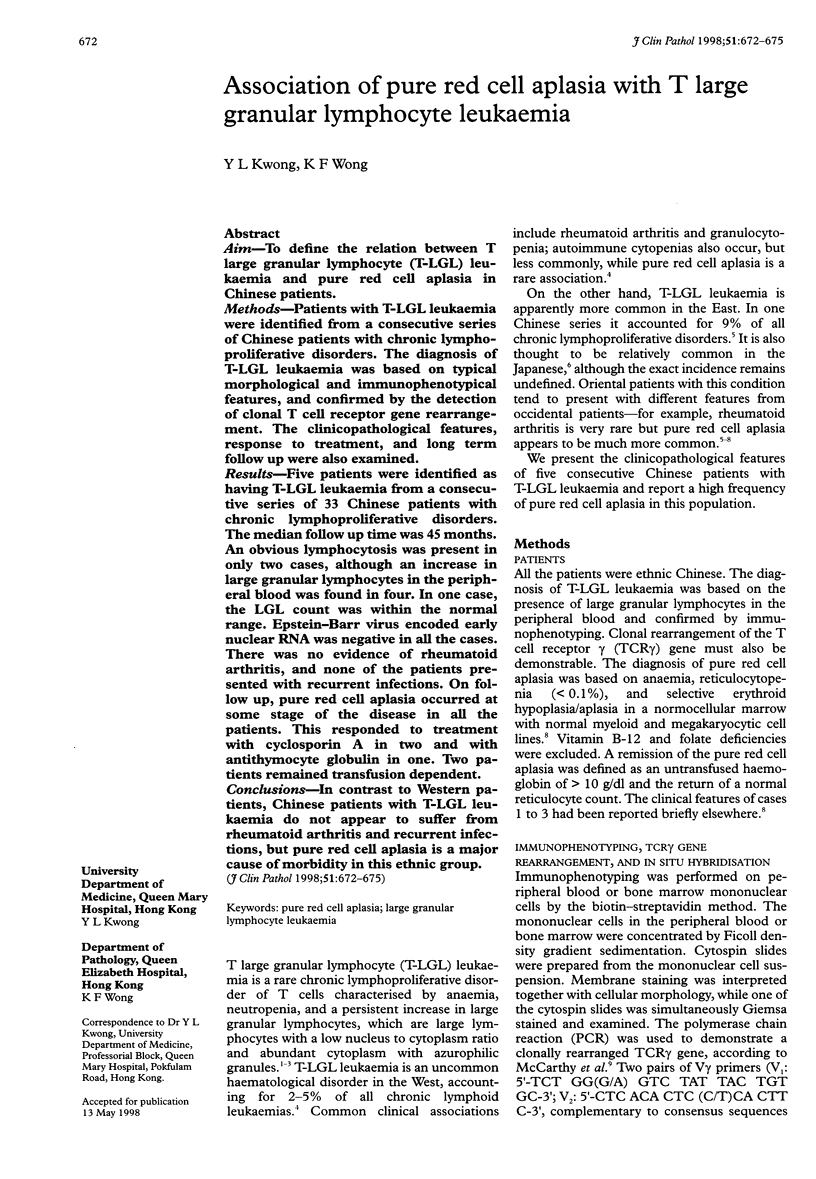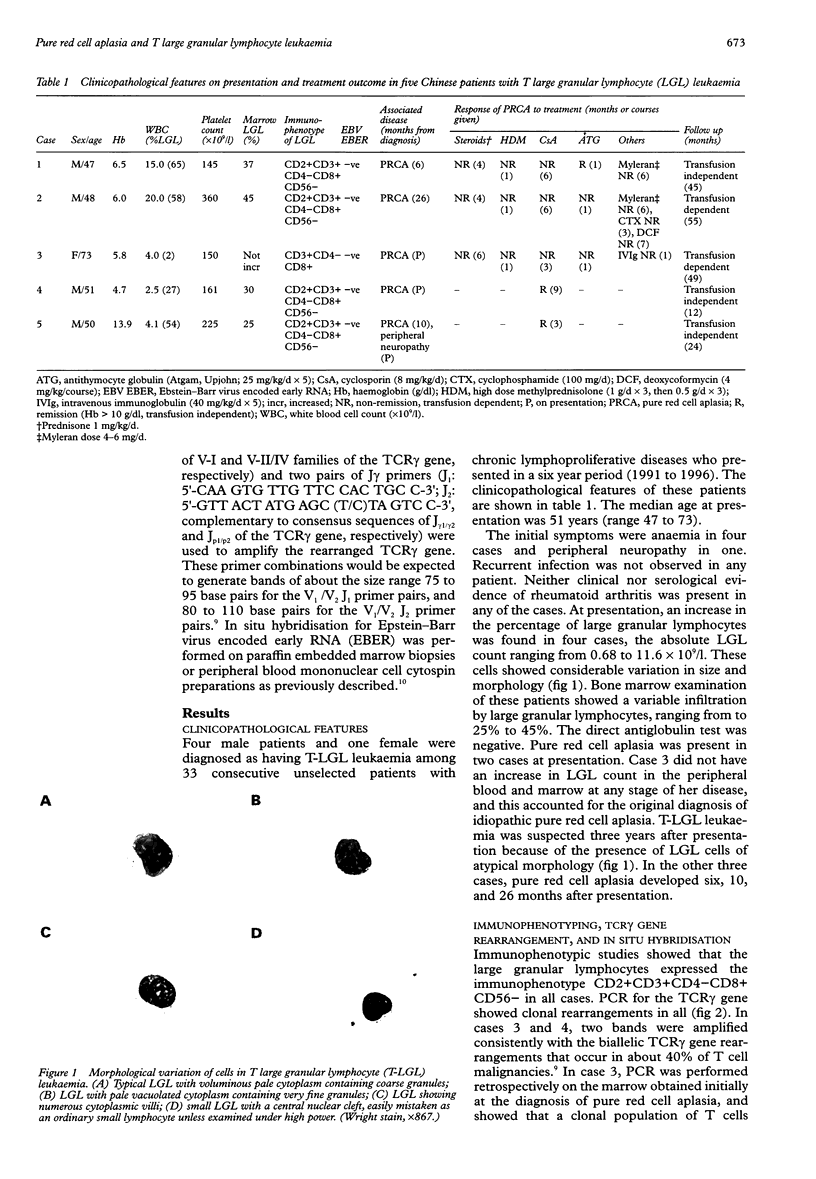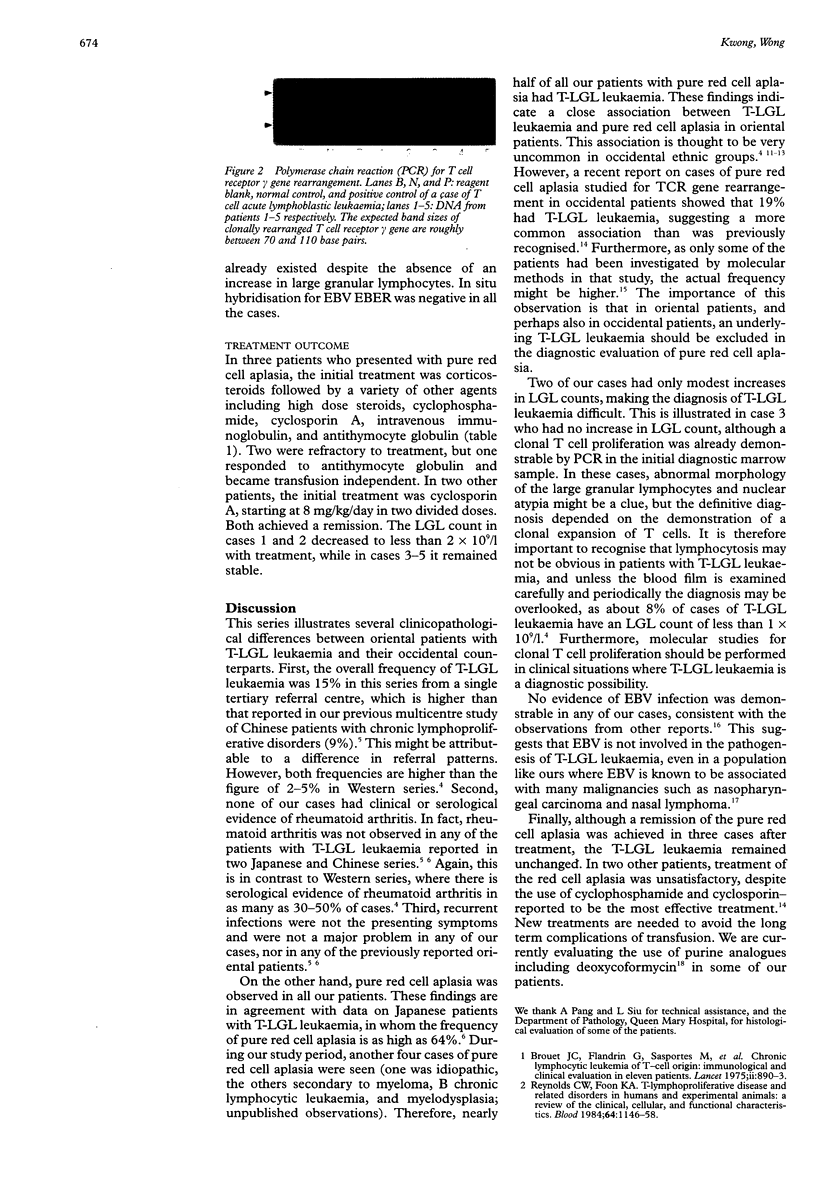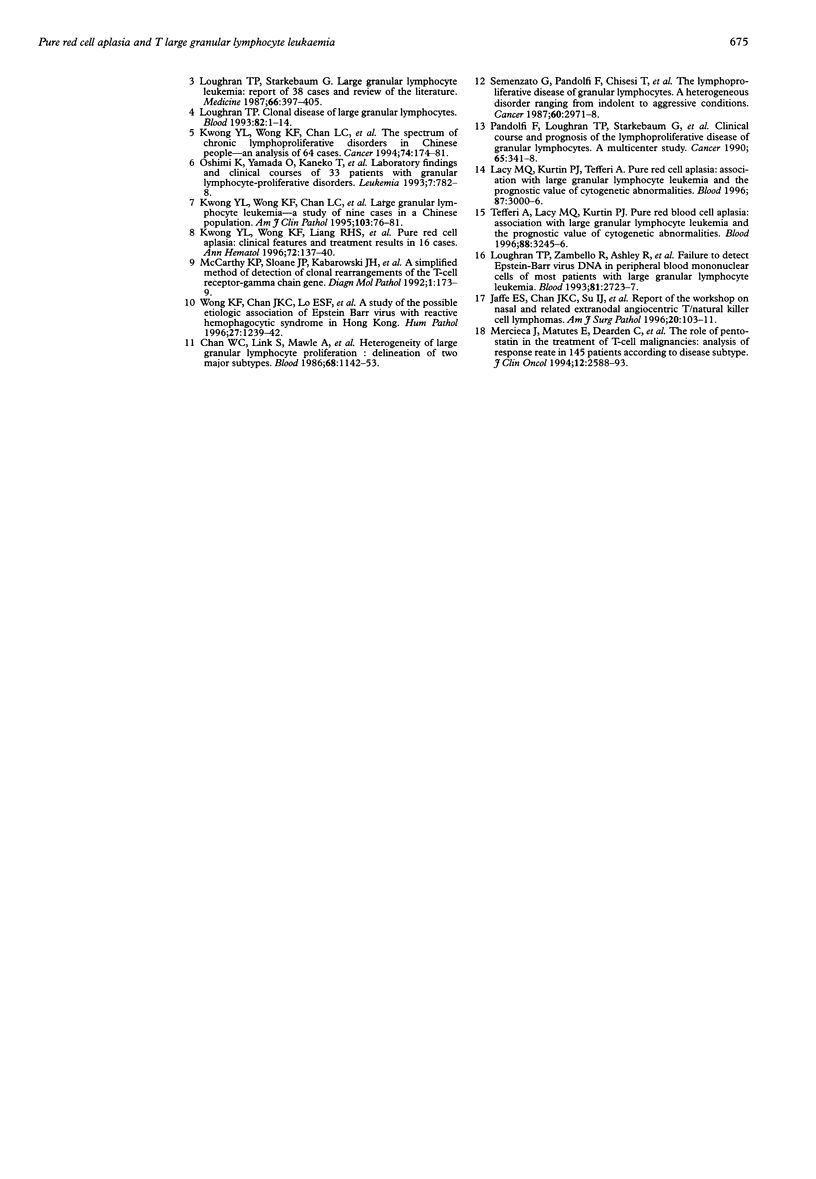Abstract
AIM: To define the relation between T large granular lymphocyte (T-LGL) leukaemia and pure red cell aplasia in Chinese patients. METHODS: Patients with T-LGL leukaemia were identified from a consecutive series of Chinese patients with chronic lymphoproliferative disorders. The diagnosis of T-LGL leukaemia was based on typical morphological and immunophenotypical features, and confirmed by the detection of clonal T cell receptor gene rearrangement. The clinicopathological features, response to treatment, and long term follow up were also examined. RESULTS: Five patients were identified as having T-LGL leukaemia from a consecutive series of 33 Chinese patients with chronic lymphoproliferative disorders. The median follow up time was 45 months. An obvious lymphocytosis was present in only two cases, although an increase in large granular lymphocytes in the peripheral blood was found in four. In one case, the LGL count was within the normal range. Epstein-Barr virus encoded early nuclear RNA was negative in all the cases. There was no evidence of rheumatoid arthritis, and none of the patients presented with recurrent infections. On follow up, pure red cell aplasia occurred at some stage of the disease in all the patients. This responded to treatment with cyclosporin A in two and with antithymocyte globulin in one. Two patients remained transfusion dependent. CONCLUSIONS: In contrast to Western patients, Chinese patients with T-LGL leukaemia do not appear to suffer from rheumatoid arthritis and recurrent infections, but pure red cell aplasia is a major cause of morbidity in this ethnic group.
Full text
PDF



Images in this article
Selected References
These references are in PubMed. This may not be the complete list of references from this article.
- Brouet J. C., Sasportes M., Flandrin G., Preud'Homme J. L., Seligmann M. Chronic lymphocytic leukaemia of T-cell origin. Immunological and clinical evaluation in eleven patients. Lancet. 1975 Nov 8;2(7941):890–893. doi: 10.1016/s0140-6736(75)92127-3. [DOI] [PubMed] [Google Scholar]
- Chan W. C., Link S., Mawle A., Check I., Brynes R. K., Winton E. F. Heterogeneity of large granular lymphocyte proliferations: delineation of two major subtypes. Blood. 1986 Nov;68(5):1142–1153. [PubMed] [Google Scholar]
- Jaffe E. S., Chan J. K., Su I. J., Frizzera G., Mori S., Feller A. C., Ho F. C. Report of the Workshop on Nasal and Related Extranodal Angiocentric T/Natural Killer Cell Lymphomas. Definitions, differential diagnosis, and epidemiology. Am J Surg Pathol. 1996 Jan;20(1):103–111. doi: 10.1097/00000478-199601000-00012. [DOI] [PubMed] [Google Scholar]
- Kwong Y. L., Wong K. F., Chan L. C., Liang R. H., Chan J. K., Lin C. K., Chan T. K. Large granular lymphocyte leukemia. A study of nine cases in a Chinese population. Am J Clin Pathol. 1995 Jan;103(1):76–81. doi: 10.1093/ajcp/103.1.76. [DOI] [PubMed] [Google Scholar]
- Kwong Y. L., Wong K. F., Chan L. C., Liang R. H., Chan J. K., Wei D., Chiu E. K., Chan C. H., Todd D., Chan T. K. The spectrum of chronic lymphoproliferative disorders in Chinese people. An analysis of 64 cases. Cancer. 1994 Jul 1;74(1):174–181. doi: 10.1002/1097-0142(19940701)74:1<174::aid-cncr2820740128>3.0.co;2-0. [DOI] [PubMed] [Google Scholar]
- Kwong Y. L., Wong K. F., Liang R. H., Chu Y. C., Chan L. C., Chan T. K. Pure red cell aplasia: clinical features and treatment results in 16 cases. Ann Hematol. 1996 Mar;72(3):137–140. doi: 10.1007/s002770050151. [DOI] [PubMed] [Google Scholar]
- Lacy M. Q., Kurtin P. J., Tefferi A. Pure red cell aplasia: association with large granular lymphocyte leukemia and the prognostic value of cytogenetic abnormalities. Blood. 1996 Apr 1;87(7):3000–3006. [PubMed] [Google Scholar]
- Loughran T. P., Jr Clonal diseases of large granular lymphocytes. Blood. 1993 Jul 1;82(1):1–14. [PubMed] [Google Scholar]
- Loughran T. P., Jr, Starkebaum G. Large granular lymphocyte leukemia. Report of 38 cases and review of the literature. Medicine (Baltimore) 1987 Sep;66(5):397–405. [PubMed] [Google Scholar]
- Loughran T. P., Jr, Zambello R., Ashley R., Guderian J., Pellenz M., Semenzato G., Starkebaum G. Failure to detect Epstein-Barr virus DNA in peripheral blood mononuclear cells of most patients with large granular lymphocyte leukemia. Blood. 1993 May 15;81(10):2723–2727. [PubMed] [Google Scholar]
- McCarthy K. P., Sloane J. P., Kabarowski J. H., Matutes E., Wiedemann L. M. A simplified method of detection of clonal rearrangements of the T-cell receptor-gamma chain gene. Diagn Mol Pathol. 1992 Sep;1(3):173–179. [PubMed] [Google Scholar]
- Mercieca J., Matutes E., Dearden C., MacLennan K., Catovsky D. The role of pentostatin in the treatment of T-cell malignancies: analysis of response rate in 145 patients according to disease subtype. J Clin Oncol. 1994 Dec;12(12):2588–2593. doi: 10.1200/JCO.1994.12.12.2588. [DOI] [PubMed] [Google Scholar]
- Oshimi K., Yamada O., Kaneko T., Nishinarita S., Iizuka Y., Urabe A., Inamori T., Asano S., Takahashi S., Hattori M. Laboratory findings and clinical courses of 33 patients with granular lymphocyte-proliferative disorders. Leukemia. 1993 Jun;7(6):782–788. [PubMed] [Google Scholar]
- Pandolfi F., Loughran T. P., Jr, Starkebaum G., Chisesi T., Barbui T., Chan W. C., Brouet J. C., De Rossi G., McKenna R. W., Salsano F. Clinical course and prognosis of the lymphoproliferative disease of granular lymphocytes. A multicenter study. Cancer. 1990 Jan 15;65(2):341–348. doi: 10.1002/1097-0142(19900115)65:2<341::aid-cncr2820650227>3.0.co;2-2. [DOI] [PubMed] [Google Scholar]
- Reynolds C. W., Foon K. A. T gamma-lymphoproliferative disease and related disorders in humans and experimental animals: a review of the clinical, cellular, and functional characteristics. Blood. 1984 Dec;64(6):1146–1158. [PubMed] [Google Scholar]
- Semenzato G., Pandolfi F., Chisesi T., De Rossi G., Pizzolo G., Zambello R., Trentin L., Agostini C., Dini E., Vespignani M. The lymphoproliferative disease of granular lymphocytes. A heterogeneous disorder ranging from indolent to aggressive conditions. Cancer. 1987 Dec 15;60(12):2971–2978. doi: 10.1002/1097-0142(19871215)60:12<2971::aid-cncr2820601220>3.0.co;2-o. [DOI] [PubMed] [Google Scholar]
- Tefferi A., Lacy M. Q., Kurtin P. J. Response: pure red blood cell aplasia: association with large granular lymphocyte leukemia and the prognostic value of cytogenetic abnormalities. Blood. 1996 Oct 15;88(8):3245–3246. [PubMed] [Google Scholar]
- Wong K. F., Chan J. K., Lo E. S., Wong C. S. A study of the possible etiologic association of Epstein-Barr virus with reactive hemophagocytic syndrome in Hong Kong Chinese. Hum Pathol. 1996 Nov;27(11):1239–1242. doi: 10.1016/s0046-8177(96)90321-4. [DOI] [PubMed] [Google Scholar]




